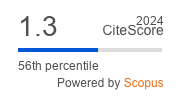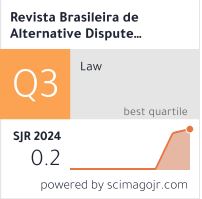ChatGPT and Other Intelligent Chatbots
Legal, Ethical and Dispute Resolution Concerns
Palavras-chave:
ChatGPT, Legal Issues, Ethical Issues, Large Language Models, Human Rights, Safety, Intellectual Property, Data PrivacyResumo
Day by day, new technologies are capturing our lives. ChatGPT and other intelligent chatbots are among the most promising ones. As an LLM based on machine learning, an intelligent chatbot represents a perfect human chatbot assistant that can give an answer to any question asked, write a poem, or analyze and improve the code. Despite its potential, ethical and legal issues of using intelligent chatbots, which also might be a reason for the disputes, are among the most significant concerns. Based on the idea of responsible innovation, this paper aimed to define critical ethical and legal issues arising from using ChatGPT and other intelligent chatbots and then attempt to overcome them to increase the trustworthiness of this technology. For intelligent chatbots to be actively and effectively used for the benefit of humanity while not undermining the credibility of LLMs, we have attempted to outline the technical, legal, and ethical problems, as well as significant dispute resolution concerns arising from the use of intelligent chatbots, and to make recommendations on how to minimize the risks and threats related to it. The results of this study can be used both in the process of law-making in the field of artificial intelligence and to contribute to the limited research in this area.
Referências
ADR SERVICES, INK. Retrieved from https://www.adrservices.com/services-2/arbitration-rules/. Access: 25.07.2023.
BEN-SHAHAR, O. The myth of the ‘opportunity to read’ in contract law, European Review of Contract Law, Vol. 5, nº 1: pp. 1-28, 2009.
BENDER, E. M., GEBRU T., MCMILLAN-MAJOR A., MITCHELL M. On the Dangers of Stochastic Parrots: Can Language Models Be Too Big?. Proceedings of the 2021 ACM Conference on Fairness, Accountability, and Transparency, 610-623, 2021.
BIDDLE, S. The Internet’s New Favorite AI Proposes Torturing Iranians and Surveilling Mosques, https://theintercept.com/2022/12/08/openai-chatgpt-ai-bias-ethics/ Access: 25.07.2023.
CHATTERJEE, J., DETHLEFS, N. This new conversational AI model can be your friend, philosopher, and guide ... and even your worst enemy, Patterns, Volume 4, Issue 1: 100676, 2023/
CHAMORRO-PREMUZIC, T. Is ChatGPT a Sexist?, https://www.forbes.com/sites/tomaspremuzic/2023/02/14/is-chatgpt-sexist/?sh=5515682a6b6b Access: 25.07.2023.
CHENG K. ChatGPT is a Blurry JPEG of the Web, https://www.newyorker.com/tech/annals-oftechnology/chatgpt-is-a-blurry-jpeg-of-the-web Access: 25.07.2023.
COOK UP AI. ChatGPT Use Cases, https://cookup.ai/chatgpt/usecases Access: 25.07.2023.
DINAN, E., ABERCROMBIE, G., BERGMAN, A.S., SPRUIT, S., HOVY, D., BOUREAU, Y.-L., RIESER V. Anticipating Safety Issues in E2E Conversational AI: Framework and Tooling, arXiv:2107.03451 [cs], http://arxiv.org/abs/2107.03451.arXiv:2107.03451 Access: 25.07.2023.
DOWLING M., LUCEY B. ChatGPT for (Finance) research: The Bananarama Conjecture, Finance Research Letters, 103662, 2023.
EKE, D.O. ChatGPT and the rise of generative AI: Threat to academic integrity?”, Journal of Responsible Technology, Vol. 13, 100060, 2023.
ELISAVETSKY, A., MARUN, M. V. La tecnologia aplicada a la resolución de conflictos: su comprensión para la eficiência de las ODR y para su proyección en Latinoamérica”, Revista Brasileira de Alternative Dispute Resolution, Vol. 2, nº 3: pp. 51-70, 2023.
FERREIRA, D.B., GROMOVA, E.A, FARIAS, B.O., GIOVANNINI C.J. Online Sports Betting in Brazil and conflict solution clauses, Revista Brasileira de Alternative Dispute Resolution, Vol. 4, nº 7, pp. 75-86, 2020.
FERREIRA, D. B., GIOVANNINI, C., GROMOVA, E., SCHMIDT, G. R. Arbitration Chambers and trust in technology provider: Impacts of trust in technology intermediated dispute resolution proceedings”, Technology in Society, vol. 68, 101872, 2022.
FERREIRA, D. B., GIOVANNINI, C., GROMOVA, E.A., Jorge Brantes FERREIRA, J.B. Arbitration chambers and technology: witness tampering and perceived effectiveness in videoconferenced dispute resolution proceedings, International Journal of Law and Information Technology, Volume 31, Issue 1, Pages 75–90, 2023. https://doi.org/10.1093/ijlit/eaad012.
GóMEZ, O. C. C., RAMÍREZ, M. C. J. Derecho y ciencia:la racionalidad científica como fundamento de la decisión judicial en el ordenamiento jurídico colombiano, Revista Chilena de Derecho, vol. 47, no 3, pp. 809-820, 2020.
GROMOVA E.A., PETRENKO S.A Quantum Law: The Beginning, Journal Of Digital Technologies And Law, 1(1) Pp. 62-88, 2023. https://Doi.Org/10.21202/Jdtl.2023.3
GROMOVA EA & FERREIRA DB Tools To Stimulate Blockchain: Application Of Regulatory Sandboxes, Special Economic Zones, And Public Private Partnerships,” International Journal Of Law In Changing World, 2(1), pp. 16-36, 2023. https://Doi.Org/10.54934/Ijlcw.V2i1.48
ICC COST CALCULATOR at https://iccwbo.org/dispute-resolution-services/arbitration/costs-andpayments/cost-calculator/. Access: 25.07.2023.
CHAT SONIC, https://chatsonic.pro/terms-and-conditions/#Reservation_of_Rights. Access: 25.07.2023.
JASPER. Jasper Chat Terms of Service at https://www.jasper.ai/legal/terms. Access: 25.07.2023.
JOBIN A., IENCA M., VAYENA E. The global landscape of ai ethics guidelines,” Nature Machine Intelligence, vol. 1, no. 9: pp. 389–399, 2019.
KENTON Z., EVERITT T., WEIDINGER L., GABRIEL I., MIKULIK V., IRVING G. Alignment Of Language Agents, Arxiv:2103.14659 [Cs], 2021 http://Arxiv.Org/Abs/2103.14659 Access: 25.07.2023.
LUPO, B. https://www.thegatewaypundit.com/2023/02/openais-chatgpt-shows-clear-racial-biasesresponses-far-left-magazine-calls-go-woke/ Access: 25.07.2023.
KIRK H. R., Y. JUN, F. VOLPIN, H. IQBAL, E. BENUSSI, F. DREYER, A. SHTEDRITSKI, Y. ASANO Bias out of-the-box: An empirical analysis of intersectional occupational biases in popular generative language models,” Advances in neural information processing systems, vol. 34: pp. 2611–2624, 2021.
KUMAR, D. From China to Syria – Here’s a list of countries that have banned ChatGPT. Know why, 2023 https://www.livemint.com/technology/tech-news/from-china-to-syria-here-s-a-list-of-countriesthat-have-bannedchatgpt-know-why-11680531688656.html Access: 13.07.2023.
LADKIN P.B. Involving LLMs in Legal Processes Is Risky,” Digital Evidence and Electronic Signature Law Review, 20, Pp. 40-46, 2023.
LAI, H., LIN, W., KERSTEN, G.E. The Importance of Language Familiarity In Global Business E-Negotiation, Electronic Commerce Research And Applications, Vol. 9: Pp. 537-548, 2010.
LEBRET,R. Word Embeddings for Natural Language Processing, 2016.
LIWEI, J., BHAGAVATULA, CH., LIANG, J., DODGE, J., SAKAGUCHI, K., FORBES, M., BORCHARDT J.,
SAADIA G., TSVETKOV YU., RINI R., CHOI Y. Can Machines Learn Morality? The Delphi Experiment”, 2022.
MICIN, S. N. C. Sobre El Ámbito Subjetivo De Aplicación Del Control De Contenido De Cláusulas No Negociadas: Una Propuesta De Generalización Con Base En Reglas Y Principios De Derecho Civil,” Revista Chilena De Derecho, Vol. 49, No 3, Pp. 137-164, 2022.
MOTRO, Y. The Current State of Large Language Models (LLM), https://www.tasq.ai/blog/largelanguage-models/ Access: 25.07.2023.
NADEEM, M., BETHKE, A., REDDY, S. Stereoset: Measuring stereotypical bias in pretrained language models, in Proceedings of the 59th Annual Meeting of the Association for Computational Linguistics and the 11th International Joint Conference on Natural Language Processing, Vol. 1: pp. 5356–5371, 2021.
ROSADO D. ChatGPT Political Bias, https://davidrozado.substack.com/p/political-bias-chatgpt Access: 25.07.2023.
STABLE DIFFUSION VS. GETTY IMAGES LAWSUIT, https://www.theverge.com/2023/1/17/23558516/ai-art-copyright-stable-diffusion-getty-images-lawsuit Access: 25.07.2023.
SOLAIMAN, I., DENNISON, C. Process for Adapting Language Models to Society (Palms) With Values-Targeted Datasets”, Neural Information Processing Systems, 2021.
STILGOE J., OWEN, R., MACNAGHTEN, P. Developing a framework for responsible innovation”, Research Policy, No 42: pp. 1568-1580, 2013.
STEINFELD, N. I agree to the terms and conditions’: (How) do users read privacy policies online? An eye-tracking experiment, Computers in Human Behavior, vol. 55, pp. 992-1000, 2016.
TADDEO, M. FLORIDI, L. How ai can be a force for good, Science, vol. 361, no. 6404: pp. 751–752, 2018.
TAIWO, J. ChatGPT: Abilities, Limitations and Applications, https://dev.to/teejay128/chatgptabilities-limitations-and-applications-o8b Access: 25.07.2023.
TAMKIN, A., BRUNDAGE, M., CLARK J., GANGULI D. Understanding the Capabilities, Limitations, and Societal Impact of Large Language Models, 2021 ArXiv abs/2102.02503.
TAYLOR, L. Colombian judge says he used ChatGPT in ruling, https://www.theguardian.com/technology/2023/feb/03/colombia-judge-chatgpt-ruling Access: 25.07.2023.
UKIPO’s public consultation on AI and IP – computer-generated works (Part 1), https://copyrightblog.kluweriplaw.com/2022/03/14/ukipos-public-consultation-on-ai-and-ip-computer-generated-workspart-1/ Access: 25.07.2023.
U.K. GAMBLING ACT – Part 2 2005– The Gambling Commission at https://www.legislation.gov.uk/ukpga/2005/19/contents. Access 25.07.2023.
VERMA, P., OREMUS, W. ChatGPT invented a sexual harassment scandal and named a real law prof as the accused, https://www.washingtonpost.com/technology/2023/04/05/chatgpt-lies/ Access: 13.07.2023.
WADDELL, T. F; AURIEMMA, J. R; SUNDAR, S. S. Make it simple, or force users to read? Paraphrased design improves comprehension of End User License Agreements, CHI ‘16: Proceedings of the 2016 CHI Conference on Human Factors in Computing Systems. New York: Association for Computing Machinery: pp. 5252-5256, 2016.
WEIDINGER, L., MELLOR, J., RAUH, M., GRIFFIN, C., UESATO, J., HUANG, P.-S., CHENG, M., GLAESE, M., BALLE, B., KASIRZADEH, A. Ethical and social risks of harm from language models, 2021, arXiv preprintarXiv:2112.04359 Access: 25.07.2023.
WELBL, J., UESATO, J., DATHATHRI, S., MELLOR, J., HENDRICKS, L.A., ANDERSON, K., KOHLI, P., COPPIN, B., HUANG, P.S. Challenges in Detoxifying Language Models.” ArXiv abs/2109.07445 (2021): pp. 2447-2469, 2021. Access: 25.07.2023.
Downloads
Publicado
Edição
Secção
Licença

Este trabalho encontra-se publicado com a Licença Internacional Creative Commons Atribuição 4.0.
No royalties or other compensation shall be due for the publication of the works.
The opinions expressed by the authors of the articles and reviews are their sole responsibility.









